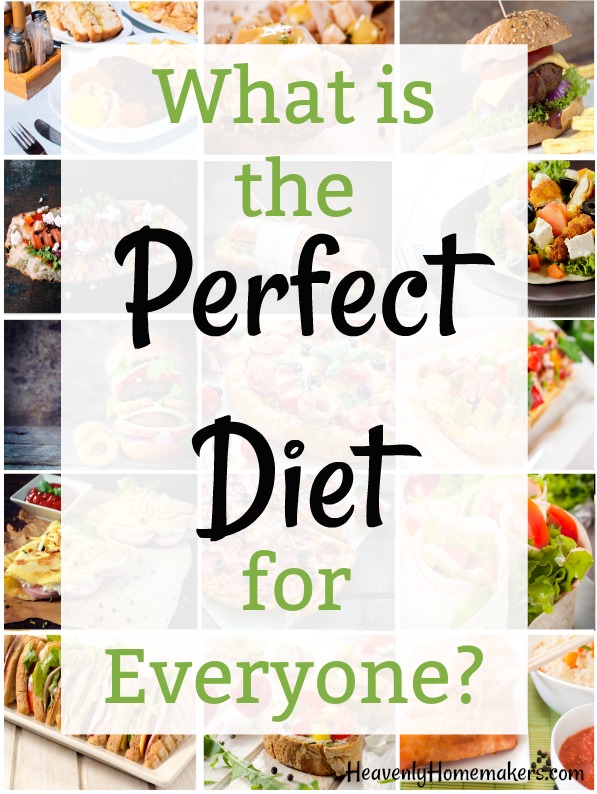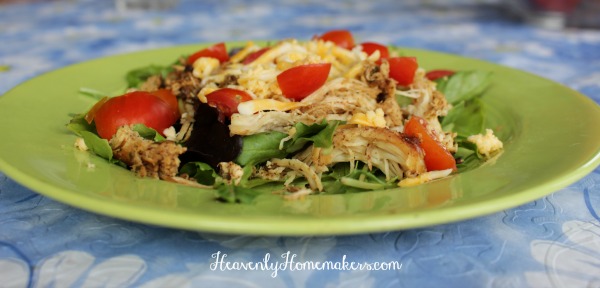I just wrote at length to share why my family eats a diet high in fat. The question is, is a high fat diet right for everyone? Is there one perfect diet for everyone?

During the past thirteen years, I’ve made healthy food my profession. I’m passionate about the subject and spend hours of time reading and learning from a variety of credible sources. Then I come up with recipes that are simple, tasty, and nourishing. Fun!

After all this time, I still find research that declares all fat to be unhealthy, especially saturated fat. I still find research that declares artificial sweeteners (like splenda and aspertame) to be a healthy option. I still find research that shows a diet high in white flour and white sugar to be heart-healthy. The trouble with these articles is that they don’t have credible data (in my opinion) to back their claims and ironically, most of these articles are written in an effort to promote synthetic drugs or manufactured “food” products.
Why have I concluded that a fats like butter and coconut oil, beef and eggs – all foods that are high in saturated fat – are healthy and beneficial? Read my thoughts about that here. But now the question of the hour…
What is the perfect diet for everyone?
Should we all eat high fat? Should we all go low carb? Is it best that we all cut out gluten? Perhaps we should all adopt the “everything in moderation” idea?
After all my years of research, and more importantly, after years of discussions with a variety of people with different needs and body types, I believe the perfect diet for everyone is:
The diet that nourishes.
The perfect diet for everyone is the one that nourishes.

I have friends who have serious health issues when consuming gluten. I know people who have to stay away from eggs and nuts entirely. I have met people who tell me that if they ate as much fat as I eat they would bloat and be miserable. I have a friend who has a fructose intolerance so all the healthy fruits in the world aren’t at all healthy for her.
Each person must determine what their body needs, what their body can handle, and what will keep them healthy and strong.
But if we aren’t eating food that nourishes, whether it is low carb, high fat, grain free, or otherwise, no matter our dietary needs or restrictions, we still aren’t offering our bodies food for good health.
As for my family, we can eat whole grains, dairy, fruits and vegetables, meat, eggs, and plenty of good, healthy fats. These foods keep us strong, energetic, and nourished. As for you and yours? Only you can determine what is healthy.
But remember: Healthy Food = Nourishing Food.
All the conflicting research we find might have us confused about what it really means to eat a healthy diet. And all the “my family eats this way and so should you” information we read can have us in a puddle of confusion.
So do your homework, and consider what nourishes. Learn what provides your family with energy, brain power, good health. Focus on eating food full of nutrients.
And one last thought:
Don’t feel bad about the occasional splurge. With all my talk about feeding my family real food that nourishes, you should know that sometimes we buy ice cream or chips from the store as a special treat and we don’t even feel bad about it. I don’t agree with the “everything in moderation” idea, because I think that lends itself to the mindset of eating whatever you want as long as you don’t overeat. This doesn’t necessarily promote a nourishing diet as an overall lifestyle. But eating a nourishing diet most of the time while occasionally splurging on a treat? You bet!
Now I’d like to hear from you! What kind of diet is nourishing for you and your family?

I agree with you, healthy nourishing foods are what to eat. Also look into intermittent fasting as it helps give your body rest so it can repair itself the way God created our bodies to do. There are many ways to do the intermittent fasting. For ezampke if you eat dinner at 5pm and breakfast at 7am you are doing 14 hours of intermittent fasting with most of the time during sleep. Snacking or grazing all day puts your body under stress. What are your thoughts on intermittent fasting?
Very interesting thoughts! I definitely think our bodies need times of fasting like this for a variety of reasons (some of them spiritual, of course!). But I’ve never thought about grazing all day putting my body under stress. I’m personally someone who needs to eat six small meals per day to feel well. So for me, I don’t think snacking puts me under stress. I digest my small amount of food and then need a little more a few hours later. I think this has been good for my body type. But it’s not for everyone!
I need 5 or 6 small meals as well. :) Big meals put stress on my healing digestion, and going hungry too long makes my healing body too weak. I do not know if this will change when I get “fully” better, but I kind of doubt it, because even before chronic illness I seemed to do better with 5 meals or snacks. But I hope one day to be able to fast on purpose again.
I plan meals around very low sodium meals. I think salt is the culprit for many health issues. It is in everything and if you eat out oh my it is ridiculous. My family can always use a salt shaker, but I find that cooking with herbs and spices doesn’t require them to use a salt shaker.
I have seen people salt cottage cheese and there are 400 mg in a half cup!
Great thoughts! I really think sugar is the root of most health issues. But certainly the amount of salt/sodium in processed foods and restaurant foods can cause huge concern! I think they small(ish) amount we get from cooking at home is good to provide needed minerals. But you are so right, it is ridiculous how much sodium is added to food unnecessarily!
Oh I agree with you about sugar to. It is all about moderation. I am like you on small meals. I have 3 meals a day and 3 snacks usually 2 are fruit and then small dessert. I am just careful what I eat.
On holidays I will splurge a little on the salt and sugar. I just feel better when I don’t overdue it on salt and sugar.
I see the meals you prepare and they have lots of fruits and vegetables which is great!
Your diet is much what I eat and it keeps me drug free even though I have Crohn’s. I have to avoid preservatives and processed food, but good healthy meats, fruits, and veggies and perfect. Love having your recipes to run to. And I especially love those where you suggest what to just pull out of the fridge and serve as sides. :)
I have to have a high carb, high salt diet or I feel miserable. I usually eat what I feel like eating and don’t have a need to snack. I occasional have a sweet treat, but not that often. I eat salads and fruits, but not everyday. Just when I feel like I need them. I do know that everyone is different. We used a calcium based toothpaste and my son’s teeth started to show signs of decay. We brush his teeth with a strong salt water solution and now they are getting better. Sodium is the number one electrolyte the human body requires to stay hydrated. So, I do not agree that salt is the main culprit in disease. I think it is the mitochondria not getting what they require.
You may need the salt but ask any cardiologist or urologist and they will tell you one of the worst things people can eat is a high salt diet as it affects the heart and kidney’s. They won’t endorse a high salt diet for almost all of their patients.
I also eat salt liberally. If I don’t my blood pressure is very low and I get lightheaded. I don’t eat any processed foods though, and I use Real Salt which is full of minerals that I need too. Low salt is not good for everyone.
I also eat all kinds of salt from regular table salt (iodine), no-salt (potassium derived) to pink Himalayan salt (on everything!). My blood pressure is also “normally” on the low side. I try and stay away from the processed stuff and do all the cooking, we don’t go out to eat. So I think it may have more to do with what kind of “sodium” we are talking about versus eliminating it altogether. And I’m sure many doctors understand this but IF they were to discuss all of that, then they would soon find themselves facing a whole new job, no?
Oh, I meant to add that I can’t do a lot of milk, yogurt or ice cream unless I take silica to counter the amount of calcium in the dairy. I can do as much butter as I desire, though. My skin starts to develop calluses. On my toes. It goes away if I do not eat a bunch of ice cream or yogurt. Or drink milk. I can have it in my cereal, but I do not have that very often.
My husband has a gluten intolerance, my children can all eat anything, and I do best on a high far vegan diet. Our meals are pretty onteresting! Lol!
I love your rational approach to the concept of “diet.” For me, the “best” thing was developing gestational diabetes with my pregnancies. I had to work with a nutritionist and discovered that much of the condition could be controlled by proper serving sizes. The American diet typically consists of “servings” that are 2-4 times as much as a person actually needs in a meal. I found myself quite satisfied when my meals were both full of nutritious foods AND the proper portion sizes. I supplemented with insulin while pregnant, as directed, but even after my pregnancies and going off insulin I made a point to serve everything in a proper portion size and it’s paid off.
I mean, you could eat a humongous pile of healthy veggies, sure, but if you have no whole grains to sustain you and no protein to fuel you, it’s not a completely nourishing meal.
I think our diet is similar to yours, except I (not the rest of the family) have to avoid pasteurized milk and limit cheese. I have recently found again so many benefits from whole grains, including helping with detox which is so important for our family. (Accidental mold exposure.) We also just got an ice-cream maker and want to try making healthy ice-cream: raw milk, raw cream, and low sweetener. After all, God said the promised land would be flowing with milk and honey! No reason it can’t be frozen, right? :D
Nourishing. That’s a great place to focus. Thanks.
I need to be gluten free, but the rest of my family doesn’t. I’ve gone the uber-restrictive route and rebounded to the “everything in moderation” approach that you alluded to…with a bit of overeating to boot. I’m finally balancing out again to simply eating more or less healthfully. Reminding myself that healthy = nourishing is pretty helpful. :-)
I get real moody without the high salt. You can ask my family. I use Himalayan sea salt and Real Salt. I also have to have some sort of wheat product at every meal. Not sure why, but I do. If my salt intake is low, but kidneys start hurting. I usually drink 1 tsp sea salt in a cup of warm water to fix it. That helped when I got the flu, too. Had not had the flu in 10 years, but my metabolism was low and I work in a dollar store, so I ended up with the flu. The salt water was the only thing that lowered my temperature. Even after I taking Tylenol. We have been through diet after diet trying to be healthy and a lot of the “healthy” diets out there just made us worse. My son developed eczema and we had Candida real bad. We went through all the diets to get rid of it and nothing worked long term. We finally decided to change it up a bit and that worked. Which was go against what everything waa saying. My son has not had eczema in a little more than a year now. Our Candida symptoms are gone. And we can eat pretty much anything we want with not I’ll effects. That is part of the high salt diet. We also eat lots of good healthy fats.
I hope I’m not hijacking the post here but this may be due to getting more trace minerals in your diet, through the salt. Thus you can also then utilize more of the nutrients in your food.
Thanks for sharing this!